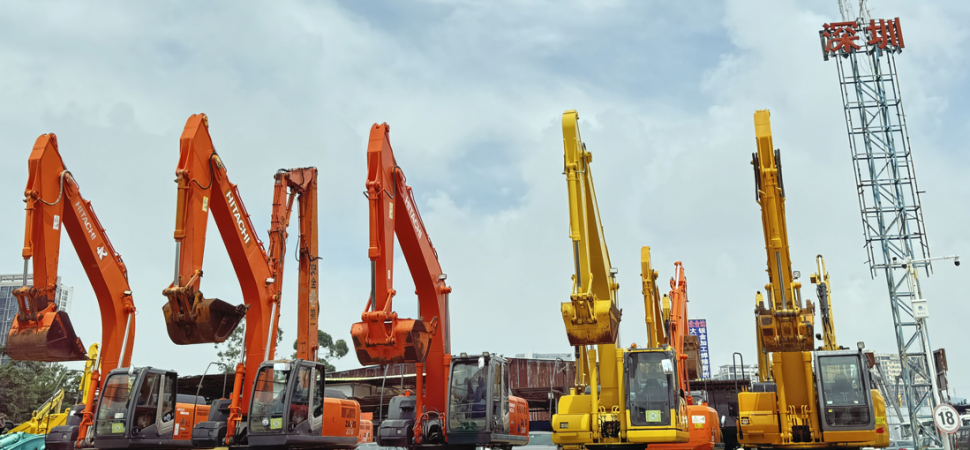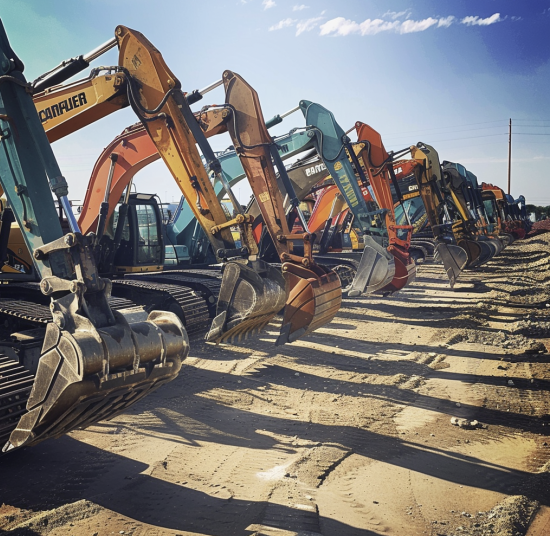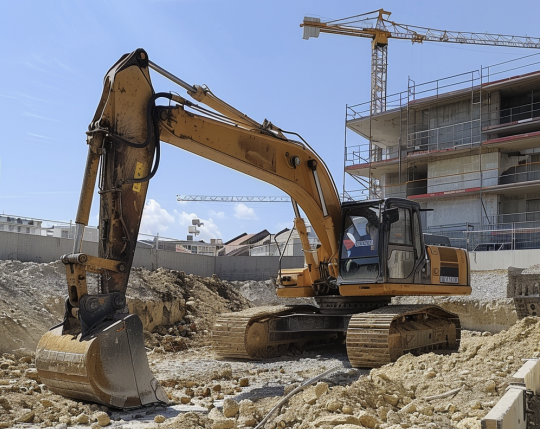Buying used excavators can be a smart and economical choice for many construction companies. However, several myths deter potential buyers from considering second-hand machinery. These misconceptions can lead to missed opportunities and unnecessary expenses. In this article, we’ll debunk some of the most common myths about buying used excavators and reveal the truth behind these misconceptions.
Myth 1: Used Excavators Are Unreliable

Reality: Used Equipment Can Be Highly Reliable
One of the most pervasive myths about used excavators is that they are inherently unreliable. The truth is that many second-hand excavators are just as reliable as new ones, provided they have been properly maintained. Reputable dealers and previous owners often keep detailed maintenance records and service histories, ensuring that the equipment is in good working condition.
Ensuring Reliability
Maintenance Records: Always ask for detailed maintenance records. These records provide insight into how well the equipment has been cared for and any issues that have been addressed.
Pre-Purchase Inspections: Conduct thorough inspections before purchasing. Look for signs of wear and tear, but also check for recent repairs or parts replacements.
Reputable Dealers: Buy from reputable dealers who specialize in second-hand equipment. They often refurbish and certify their machines, providing added assurance of reliability.
Case Study: A Reliable Investment
Consider the case of a construction company that purchased a used Caterpillar excavator. The machine had been meticulously maintained, and its service records were up-to-date. After a thorough inspection, the company decided to buy it. Over the next five years, the excavator performed reliably on various projects, demonstrating that used equipment can indeed be a sound investment.
Myth 2: Used Excavators Have a Short Lifespan
Reality: Proper Maintenance Extends Lifespan
Many believe that used excavators have a significantly shorter lifespan than new ones. However, with proper maintenance and care, used excavators can operate efficiently for many years. Modern construction equipment is built to last, and with regular upkeep, its lifespan can be extended considerably.
Tips for Extending Lifespan
Regular Maintenance: Follow a strict maintenance schedule, including regular oil changes, filter replacements, and inspections.
Quality Parts: Use high-quality parts for any replacements or repairs. This can prevent further damage and extend the equipment’s operational life.
Trained Operators: Ensure that operators are properly trained. Incorrect usage can lead to unnecessary wear and tear, shortening the machine’s lifespan.
Real-World Example
A mid-sized construction firm purchased a second-hand Komatsu excavator that had seen a decade of use. By implementing a rigorous maintenance routine and using OEM parts for any necessary repairs, the company extended the excavator’s operational life by another ten years. This example shows that with the right care, used equipment can serve long and productive lives.
Myth 3: Used Excavators Are Outdated
Reality: Many Used Excavators Feature Modern Technology
It’s a common misconception that used excavators are outdated and lack the latest technology. In reality, many used machines are equipped with modern features, including advanced hydraulics, GPS systems, and telematics. Additionally, older machines can often be retrofitted with new technology to enhance their performance and efficiency.
Modernizing Used Equipment
Upgrades: Invest in upgrades such as GPS systems or improved hydraulics to bring older machines up to current standards.
Technology Integration: Look for used models that already include advanced technology. Many machines from the past decade come equipped with sophisticated systems.
Dealer Services: Some dealers offer upgrade services as part of their sales package, providing the latest technology in older models.
Industry Insight
A large construction company upgraded its fleet of second-hand excavators with modern telematics systems. These upgrades allowed for real-time monitoring of machine performance, leading to improved efficiency and reduced downtime. The integration of modern technology into older machines can bring substantial operational benefits.
Myth 4: Used Excavators Are Not Cost-Effective
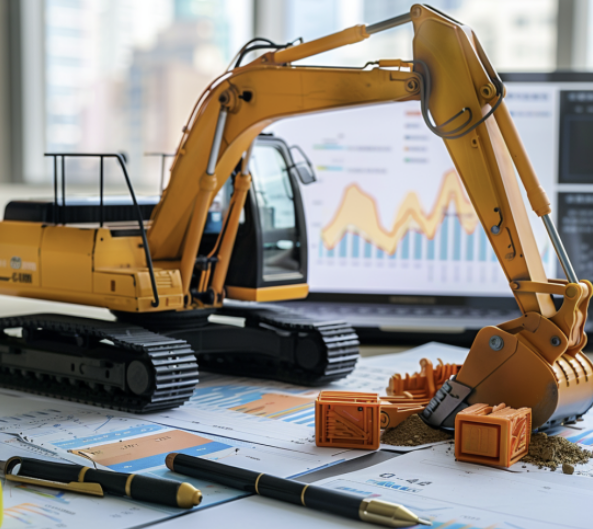
Reality: Used Equipment Offers Significant Cost Savings
Another myth is that buying used excavators does not offer good value for money. The truth is that used equipment can provide significant cost savings, both in terms of initial purchase price and overall operating costs. Depreciation on new equipment is steep, whereas used machines have already undergone this initial loss in value.
Financial Benefits
Lower Purchase Price: Used excavators are typically much cheaper than new ones, allowing businesses to acquire high-quality equipment at a fraction of the cost.
Depreciation: Used equipment has already depreciated, so it retains its value better over time compared to new machines.
Financing Options: Many dealers offer attractive financing options for used equipment, making it easier to manage cash flow and budget constraints.
Comparative Analysis
A construction startup compared the cost of purchasing new versus used excavators. They found that the initial savings from buying used machines allowed them to invest in additional equipment and training for their staff. Over the first year, they saved 30% on their equipment budget while maintaining high productivity levels.
Myth 5: Used Excavators Are Hard to Finance
Reality: Financing Options Are Readily Available
Some buyers believe that financing used excavators is more difficult than financing new ones. However, many financial institutions and equipment dealers offer flexible financing options for used machinery. These options can be tailored to suit different budgetary requirements and financial situations.
Exploring Financing Options
Dealer Financing: Many dealers provide in-house financing options, which can be more flexible and easier to obtain than traditional bank loans.
Leasing: Consider leasing used equipment as an alternative to purchasing. Leasing can offer lower monthly payments and the ability to upgrade to newer models at the end of the lease term.
Bank Loans: Many banks and financial institutions offer loans specifically for purchasing used equipment. These loans often have competitive interest rates and terms.
Success Story
A small excavation company needed to expand its operations but was constrained by budget. By leveraging dealer financing for used excavators, they managed to acquire several high-quality machines without straining their finances. This allowed them to take on larger projects and increase their revenue substantially.
Myth 6: Used Excavators Have Hidden Problems

Reality: Thorough Inspections Can Uncover Issues
Potential buyers often worry that used excavators come with hidden problems that could lead to costly repairs. While it is possible to encounter issues with any piece of equipment, thorough inspections and due diligence can mitigate these risks.
Conducting Thorough Inspections
Hire Experts: Consider hiring a professional inspector or mechanic to assess the equipment before purchase. They can identify potential issues that may not be apparent to an untrained eye.
Test Drives: Always take the equipment for a test drive to assess its performance under working conditions.
Warranty and Return Policies: Buy from dealers who offer warranties or return policies. This provides a safety net in case any unforeseen issues arise after purchase.
Inspection Checklist
A detailed inspection checklist can help identify potential issues. This should include:
Checking the engine and hydraulics for leaks or unusual noises.
Inspecting the undercarriage for wear and tear.
Verifying the functionality of the controls and electronics.
Reviewing the maintenance history for any recurring problems.
Myth 7: Used Excavators Lack Warranty Protection
Reality: Warranties Are Often Available
Many buyers assume that used excavators do not come with warranty protection. However, many reputable dealers offer warranties on their used equipment, providing peace of mind and protection against unexpected repair costs.
Warranty Options
Dealer Warranties: Look for dealers who offer warranties on their used equipment. These warranties can cover major components and provide assurance of quality.
Extended Warranties: Consider purchasing extended warranties for added protection. These can cover longer periods and more extensive repairs.
Manufacturer Warranties: Some used equipment may still be under the original manufacturer’s warranty, especially if it is relatively new.
Warranty Coverage
Understand what the warranty covers. Common elements include:
Powertrain: Coverage for the engine, transmission, and related components.
Hydraulics: Protection for the hydraulic system, including pumps, cylinders, and hoses.
Electrical Systems: Warranty for electrical components, such as wiring and control units.
Myth 8: Used Excavators Are Only Suitable for Small Projects
Reality: Used Equipment Can Handle Large-Scale Projects
There is a misconception that used excavators are only suitable for small, less demanding projects. In reality, used excavators can be just as capable as new ones in handling large-scale and complex construction projects.
Project Suitability
Performance: Assess the performance specifications of the used equipment. Many used excavators have the power and capacity to handle demanding tasks.
Versatility: Used excavators are available in a variety of sizes and configurations, making them suitable for a wide range of projects, from small landscaping jobs to major construction sites.
Reliability: With proper maintenance and care, used excavators can perform reliably on large projects, ensuring that work is completed efficiently and effectively.
Large-Scale Success
A construction firm specializing in infrastructure projects used second-hand Hitachi and Volvo excavators for a major highway expansion. Despite being used, the machines performed flawlessly, demonstrating that second-hand equipment can tackle even the most extensive and challenging projects.
Myth 9: Used Excavators Are Difficult to Resell

Reality: There Is a Strong Market for Used Equipment
Another common myth is that used excavators are difficult to resell. In truth, there is a robust market for used construction equipment. Many companies look to purchase second-hand machinery to save costs, creating a steady demand for used excavators.
Factors Enhancing Resale Value
Good Condition: Keeping the excavator in good condition through regular maintenance can significantly enhance its resale value.
Service Records: Maintaining detailed service records can provide potential buyers with confidence in the equipment’s condition.
Upgrades and Repairs: Any recent upgrades or significant repairs can make the excavator more attractive to buyers.
Market Demand: Stay informed about market trends and demand for specific models and brands. Some brands, like Caterpillar and Komatsu, tend to hold their value well in the resale market.
Successful Resale Example
A small construction company upgraded its fleet and decided to sell its older, used excavators. By ensuring the machines were well-maintained and providing comprehensive service records, they successfully sold the equipment at a competitive price. The funds from the sale were then reinvested into purchasing newer models, showcasing the viability of the resale market for used machinery.
Myth 10: Used Excavators Are Less Safe
Reality: Safety Is Dependent on Maintenance and Operation
Safety concerns are often cited as reasons to avoid used excavators. However, the safety of an excavator is more dependent on its maintenance and operation than its age. Well-maintained used excavators can be just as safe as new ones.
Ensuring Safety
Regular Inspections: Conduct regular safety inspections to identify and address any potential issues.
Proper Maintenance: Follow the manufacturer’s recommended maintenance schedule to ensure all safety systems are functioning correctly.
Operator Training: Ensure operators are well-trained in both the equipment’s operation and safety protocols.
Safety Features: Some used excavators come with advanced safety features. Verify that these features are functional and up to date.
Safety Case Study
A construction firm specializing in urban development projects purchased a fleet of used excavators equipped with modern safety features such as backup cameras, alarms, and reinforced cabs. By adhering to a strict maintenance regimen and providing thorough operator training, the company maintained a stellar safety record, demonstrating that used equipment can meet high safety standards.
Myth 11: Used Excavators Have Poor Fuel Efficiency
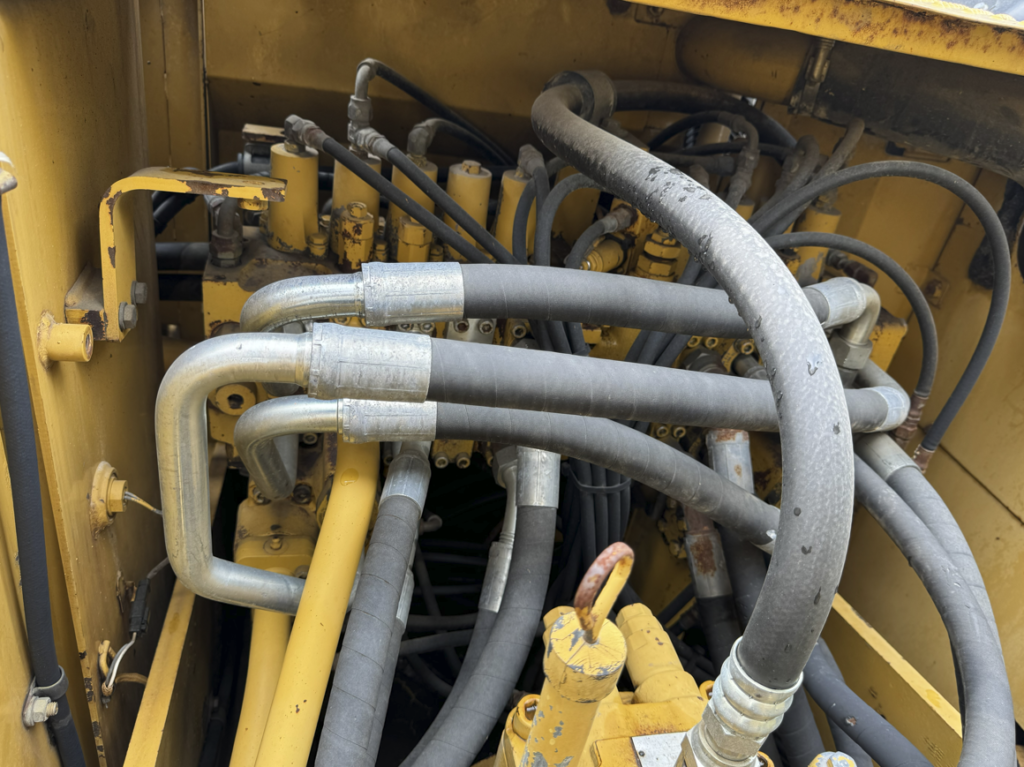
Reality: Many Used Excavators Are Fuel-Efficient
There is a misconception that used excavators are less fuel-efficient compared to new models. While older machines may not have the latest fuel-saving technologies, many used excavators are still quite fuel-efficient. Additionally, some older models can be retrofitted with newer, more efficient engines and systems.
Improving Fuel Efficiency
Engine Tuning: Regular engine tuning and maintenance can improve fuel efficiency.
Upgrade Options: Explore retrofit options that enhance fuel efficiency, such as modern fuel injectors or optimized hydraulic systems.
Operator Practices: Train operators in fuel-efficient practices, such as minimizing idle time and using appropriate power settings.
Efficiency in Practice
A landscaping company upgraded the fuel systems on their used John Deere excavators, resulting in a 15% improvement in fuel efficiency. This not only reduced operational costs but also lessened their environmental impact, proving that used machines can be both cost-effective and eco-friendly.
Myth 12: Used Excavators Are Hard to Insure
Reality: Insurance for Used Equipment Is Readily Available
Some believe that insuring used excavators is more difficult or costly than insuring new ones. However, many insurance providers offer policies specifically tailored to used construction equipment. These policies can provide comprehensive coverage, including liability, damage, and theft protection.
Finding Insurance
Specialized Providers: Work with insurance companies that specialize in construction equipment. They often offer better rates and coverage options for used machinery.
Bundling Policies: Consider bundling your equipment insurance with other business policies to receive discounts and streamlined service.
Comprehensive Coverage: Ensure your policy covers all potential risks, including operational hazards, weather damage, and theft.
Insurance Success
A construction firm specializing in residential building projects found an insurance provider that offered comprehensive coverage for their fleet of used excavators. By bundling their equipment insurance with their general liability and property insurance, they received a substantial discount, proving that insuring used equipment can be straightforward and cost-effective.
Conclusion
Buying used excavators can be a practical, cost-effective, and environmentally friendly choice for construction companies. By debunking these common myths, we can see that second-hand equipment offers numerous benefits, from reliability and cost savings to technological advancements and environmental sustainability. Conduct thorough inspections, work with reputable dealers, and explore financing options to make informed decisions and reap the benefits of used construction equipment. Embrace the opportunities that used excavators provide and enhance your construction operations without breaking the bank.
Additional Tips for Buyers
Research: Spend time researching different brands and models. Understand their strengths, weaknesses, and typical lifespan.
Network: Connect with other construction professionals who have experience with used equipment. Their insights can be invaluable.
Documentation: Ensure all documentation, including ownership papers and maintenance logs, are in order before purchase.
Final Thoughts
The market for used excavators is robust and full of opportunities. By approaching the purchase with the right knowledge and due diligence, you can acquire high-quality equipment that meets your project needs and budget constraints. Don’t let myths and misconceptions prevent you from making a smart, economical choice for your business.

